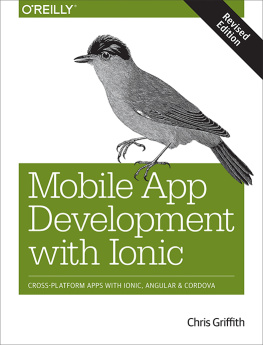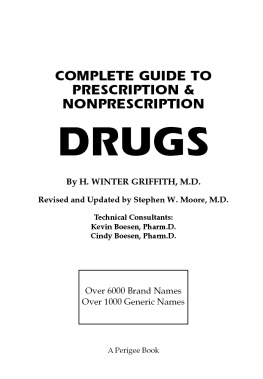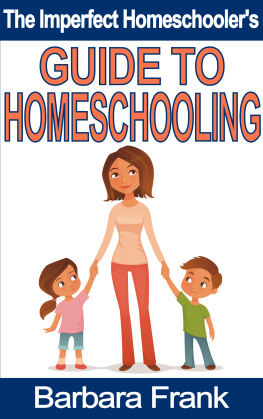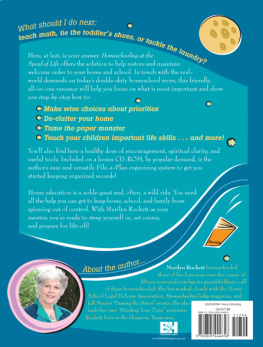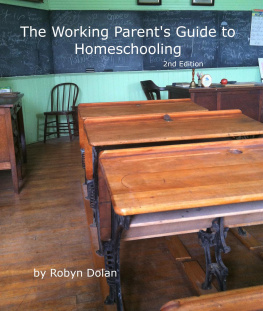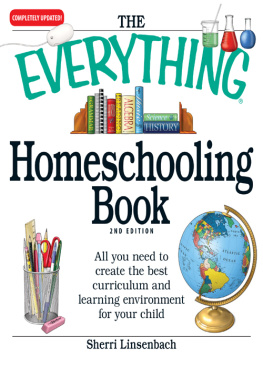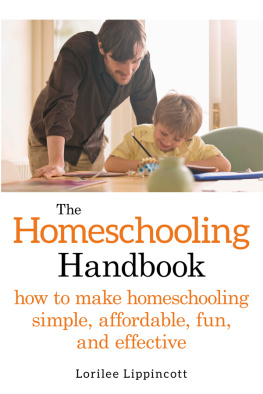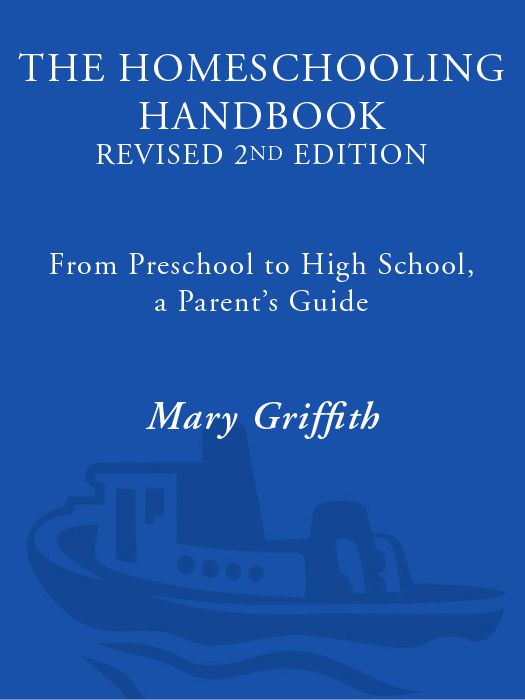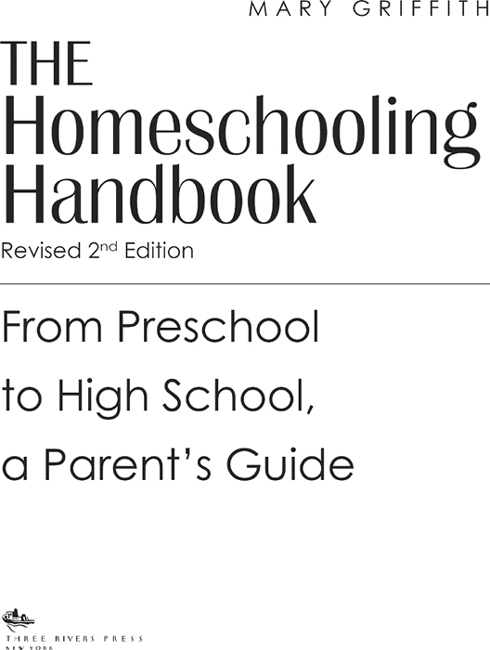ACKNOWLEDGMENTS FMH

One of the real pleasures of writing and eventually revising this book was working with the homeschooling parents who so willingly and articulately shared with me how their families homeschool: Karin Boosman, Lisa Medlen Bugg, Tammy Cardwell, Carolyn Clark, Deborah A. Cunefare, Laura Derrick, Alisanne Fleitman, Peggy Flints, Pam Hartley, Shari Henry, Linda Inouye, Beverly S. Krueger, Ava Miller, Cindy Sulaiman, and Grace Sylvan. Contributing additional material for the revised edition were Carol Burris, Tammy Glaser, Elizabeth Kanna, Monica Molinar, Barb Simonds, and Jennifer Tompkins. All were unfailingly helpful, eager to explain their own versions of homeschooling, and terrific reminders of why I so much appreciate and enjoy the homeschooling community.
Once again, thanks are due to the friends and colleagues from whom Ive learned and continue to learn much of what I know about homeschooling (and many of whom also shared details of their homeschooling lives): Helen and Mark Hegener, Patrick Farenga, Micki and David Colfax, Donna E. Nichols, Ann Zeise, Linda Dobson, Janie Levine, Dianna Broughton, Sandra Dodd, Edith Touchstone, Anne Wasserman (known to homeschoolers on the Internet as anne in chicago), and Karl Bunday (who graciously allows me to include his ever-growing list of colleges friendly to homeschoolers); my dedicated fellow activists (and dear friends) from the Homeschool Association of California: Barbara David, Melissa Hatheway, Kim and Julie Stuffelbeam, Steve Greenberg, Diane Kallas, Lanis LeBaron, Carol Edson, Jill Boone, Lillian Jones, and Margaret Arighi; and the stimulating crowd of regular posters on the Home Ed and Unschooling Internet mailing lists and in the America Online homeschooling forums.
The folks at Prima Publishing continue to make the process of getting books ready for publication seem almost easy, especially Jamie Miller, Michelle McCormack, Laura Larson, and Leslie Ayers.
And still to thank are all those homeschooled kidsincluding my own daughterswho continue to provoke and exhaust and astonish and energize and amaze their parents. I am privileged to watch them learn and grow.
TERMS FMH

Several terms are commonly used to refer to parents taking direct responsibility for their childrens education by teaching them at home, and debate within the homeschooling community over which term is most appropriate is surprisingly lively.
Consider the basic choices: unschooling; deschooling; home education; and home schooling, home-schooling, or homeschooling. The choice is not as simple or as meaningless as it first appears.
Unschooling and deschooling are a bit confusing. Unschooling can mean the actual process of educating ones child outside the confines of a conventional school, and it can also be a specific approach to learning that emphasizes following the childs interests. Though all unschoolers are homeschoolers, not all homeschoolers are necessarily unschoolers. Deschooling can also mean the process of educating children outside the conventional classroom, but most often today it refers to the process of getting used to homeschooling. Many children and parents who are accustomed to learning taking place in a formal classroom setting need several weeks or months of deschooling to settle comfortably into a homeschooling routine.
Home education is not a bad choice. Its fairly inclusive, covering all kinds of homeschooling styles without seeming to imply that any one is more proper than others. Its a bit awkward, though, to adapt when you need to use a different part of speech, as with home educators, home educated, or home educating.
Home schooling, home-schooling, and homeschooling are actually all the same term, demonstrating differing levels of acceptance. The same thing happened with computer terminology a few years back. First there was micro computer, which gradually turned into micro-computer and, finally, microcomputer. (Of course, nobody talks about microcomputers much anymore, but thats a different story.) Academic articles about homeschooling still frequently use the two-word version, although the compound is making headway. The hyphenated version is becoming rarer, although its still often seen in newspaper articles about homeschooling, often side by side with the other versions while copy editors waffle on the decision of which to use.
I adopted the compound versionhomeschoolingyears ago because it seemed less awkward than the others and was flexible enough to take on all the noun and verb and adjectival forms without too much trauma. Homeschoolers could homeschool their homeschooled children without an overabundance of hyphens or other confusion. As you can see, the meaning of the term varies: It can refer to the educational process itself, to the children who are the objects of that process, to the parents who choose that process for their children, and to the entire population of families who homeschool.
I also like the inference I can take from the compound version: Homeschooling somehow seems less formal and institutional a term than home schooling. It sounds more like its own meaning and less like a borrowed term than the others do.
Some homeschoolers, though, dislike the word and prefer something such as home learning or homelearning as more in line with their understanding of the concept. Ive even heard of those who feel that home is too limiting and opt instead for world learning or some similar variant. Although such terms may be more in keeping with their users views, they tend to keep those users constantly explaining what on earth they are talking about.
As David Guterson explains in his book Family Matters, homeschooling is an odd word for what it describes, but it does have the distinct advantage of being readily understood by the general public. Thats a hard advantage to beat, and I wont even try.
INTRODUCTION FMH

Announcement: Were homeschooling our kids.
Response ten years ago: Youre doing what? Whats that?
Response today: Oh, yeah? I know someone who does that. But I could never do it myselfit would be so much work!
Homeschooling has definitely arrived. From a few decades ago, when the practice was so rare that the word hadnt entered the language, homeschooling has become one of the fastest-growing educational movements in the country. Accurate estimates are hard to come by (some states make no counts of homeschoolers), but most experts agree that, as of 1995, at least half a million school-age children were getting their education from their parents, outside of schools. Some authorities put the number as high as a million and a half to two million. However they may dispute the total number of homeschoolers, those authorities agree that the homeschooling is growing rapidly, by as much as 20 percent annually in some regions.





